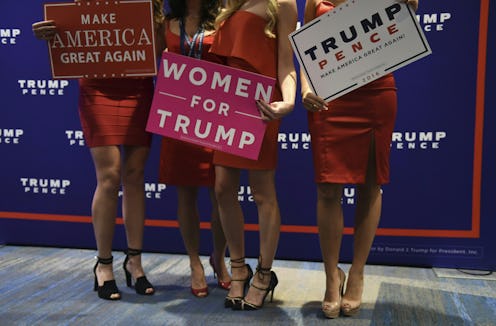Life
What The Election Says About Sexual Assault
On Nov. 8, after long months of presidential campaigning finally began to draw to a close, one fact became clear: The 2016 election speaks volumes about sexual assault in the United States, and the takeaway certainly isn't pretty. If you found it difficult to keep up with the sheer variety of scandals surrounding the current election, allow me to remind you of the most significant: In the last few weeks before Election Day, Donald Trump was accused of alleged sexual assault by 12 women. (He has denied these allegations.) Additionally, a tape from 2005 surfaced in which the GOP nominee, while speaking into a hot mic, bragged about grabbing women by their genitals. (In the second presidential debate, he denied that he had groped women in the way he described in the tapes.)
No matter what becomes of the allegations, the country's response to these incidents says so much about the way sexual assault is treated in the United States. Women who went public with allegations faced intense scrutiny, especially from Trump's supporters. The anonymous woman who accused Trump of allegedly assaulting her when she was a child, for instance, cancelled her press conference after receiving numerous death threats, and Alicia Machado — the former Miss Universe who was reportedly insulted by Trump in the past — told People that she endured similar threats as well as lewd remarks from strangers after she campaigned for Hillary Clinton prior to the election.
Was this scrutiny also directed toward Trump, who was campaigning to be the next president? Certainly not from his supporters, if polls were anything to go by.
After the release of the hot mic tapes, followed by numerous allegations of sexual assault, you’d think that a presidential candidate — someone who is supposed to lead and represent the United States — would experience a dip in the polls. Although some prominent Republicans used the tapes as an excuse to abandon ship before the election, an NBC News-Survey Monkey poll conducted several days later reported that "nearly all Trump supporters, Republicans, and Republican-leaning independents" thought the tape controversy distracted from the presidential campaign. A Washington Post-ABC News poll found that Clinton had a four point lead over Trump in the wake of the tapes, but 64 percent of likely voters (and 84 percent of Republicans) said the controversy wouldn't "make any difference" in their voting habits.
On election day, that appeared to be true: Although the aforementioned NBC-Survey Monkey poll found that most voters believed Trump didn't respect women — not to mention his history of sexist language toward women — the race between Clinton and Trump has proven to be incredibly close. Given the number of votes Trump has received, it's clear that for thousands of voters, allegations of sexual assault (which Trump denied) simply don't deserve the same consideration as, say, building a wall on the U.S. border.
This tweet says it all:
No matter the outcome, the 2016 election has shown that in the United States, there's still a long way to go before alleged sexual assault is taken as seriously as it deserves.
